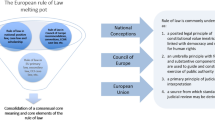Summary
All in all it can be stated that since the heterogeneity of the EU will increase considerably due to its enlargement and at the same time the trend towards centralisation and redistribution will be strengthened, secession and opting out will become important as constitutional arrangements for the EU. They are an instrument against stronger centralisation and redistribution mechnanisms. They make a contribution to the operationality of the subsidiarity principle. They form a counterweight to the domination of minorities by majority decisions. At the same time they facilitate the mechanisms for the endogenous determination of the optimal size of the EU and for the increasing of the efficiency of the EU institutions in the sense of federalism theory. Globalisation increasingly requires and enforces liberal institutions of integration. Every country should therefore have the choice of terminating its participation in a Community policy or even its membership of a club in a regulated fashion. Thus, the European Convention has made a trail-blazing proposal with the constitutional right of secession from the EU.
Similar content being viewed by others
References
Friedemann Götting: Die Beendigung der Mitgliedschaft der Europäischen Union, Baden-Baden 2000.
Peter Bernholz: Grundzüge einer europäischen Verfassung, in: Detmar Doering, Fritz Fliszar (eds.): Freiheit— die unbequeme Idee: Argumente zur Trennung von Staat und Gesellschaft, Stutgart 1994, pp. 189–200; Detmar Doering: Austritt erlaubt? Die Verfassung der Europäischen Union braucht ein Sezessionsrecht, in: Ordo, Vol. 51, 2000, pp. 383–404; James M. Buchanan: Europe's Constitutional Opportunity, in: Institute of Economic Affairs Readings, Vol. 33, London 1990; European Constitutional Group: A Proposal for a European Constitution, London 1993; Roland Vaubel: The Political Economy of Centralization and the European Community, in: Public Choice, Vol. 81, 1994, pp. 151–190.
Murray N. Rothbard: Nations by Consent — Decomposing the Nationa-State, in: David Gordon (ed.): Secession, State and Liberty, New Brunswick and London 1998, pp. 79–88.
Viktor Vanberg: Bürgersouveränität und Zuordnung politischer Kompetenzen in föderalen Systemen: Das Beispiel EU, in: Wolf Schäfer (): Zukunftsprobleme der europäischen Wirtschaftsverfassung, Berlin 2004 (forthcoming).
Norbert Berthold, Michael Neumann: Opting-Out Klausseln und der Europäische Einigungsprozeß: Eine sezessionstheoretische Analyse, Würzburg 2002.
Alberto Alesina, Roberto Perotti: Economic Risk and Political Risk in Fiscal Unions, in: Economic Journal, Vol. 108, 1998, pp. 989–1008.
Alberto Alesina, Romain Wacziarg: Openness, Country Size and the Government, in: Journal of Public Economics, Vol. 69, 1997, pp. 305–21.
Author information
Authors and Affiliations
Rights and permissions
About this article
Cite this article
Schäfer, W. Withdrawal legitimised? On the proposal by the constitutional Convention for the right of secession from the EU. Intereconomics 38, 182–185 (2003). https://doi.org/10.1007/BF03031704
Issue Date:
DOI: https://doi.org/10.1007/BF03031704




